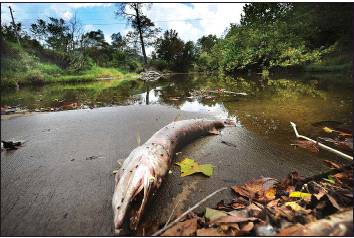Dead Fish Found Upstream
Mine May Not be Responsible for Fouling Dunkard
Morgantown Dominion Post
20 September 2009
By Tracy Eddy

More dead fish have been found in Dunkard Creek — only this time about
1.5 miles upstream from the Blacksville No. 2 coal mine. The discovery
has officials doubting that the mine is solely responsible for the
kill.
West Virginia DEP spokeswoman Kathy Cosco said the mining operation
could still be contributing to the pollution that may be killing fish
in more than 20 miles of the creek. However, the dead fish that were
found upstream “makes us think there’s something more to it than that,”
she said.
Hundreds of dead fish and other wildlife have been reported by
residents living along Dunkard Creek — in West Virginia and
Pennsylvania — since Sept. 3.
DEP officials are still investigating, Cosco said. On Friday,
investigators flew over the area in a helicopter to see if they could
notice something they’d missed on the ground.
“We’ve not come to any conclusion yet,” she said. “It’s a unique
situation. There are so many different factors that play into this.”
Earlier this week, Cosco said West Virginia DEP officials had a
“hypothesis” that the pollution is coming from an outlet at the
Blacksville No. 2 mine. CONSOL is also investigating. The Blacksville
mine is in western Monongalia County near the Pennsylvania border.
Longwall production at the mine resumed in late August after being idle
for about two months because of a decrease in demand.
Several agencies, including the Pennsylvania and West Virginia DEPs and
the West Virginia DNR have been testing creek water — and fish blood,
tissue and organ samples — to determine the cause of the kill.
Some residents have reported seeing large orange tanker trucks parked
in Brave, Pa., with hoses running into the creek. But Pennsylvania DEP
Spokeswoman Katy Gresh said the trucks were withdrawing water, not
dumping into the creek.
“It was not any illegal activity,” she said.
Inspectors did ask the company to stop withdrawing water from the creek
until the fish kill is resolved, Gresh said, because of residents’
concerns about the “suspicious” activity.
